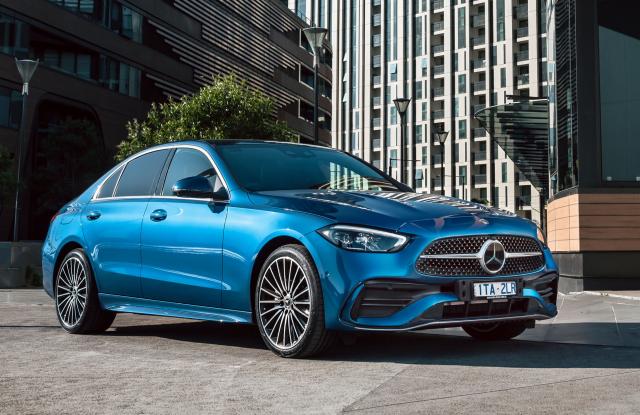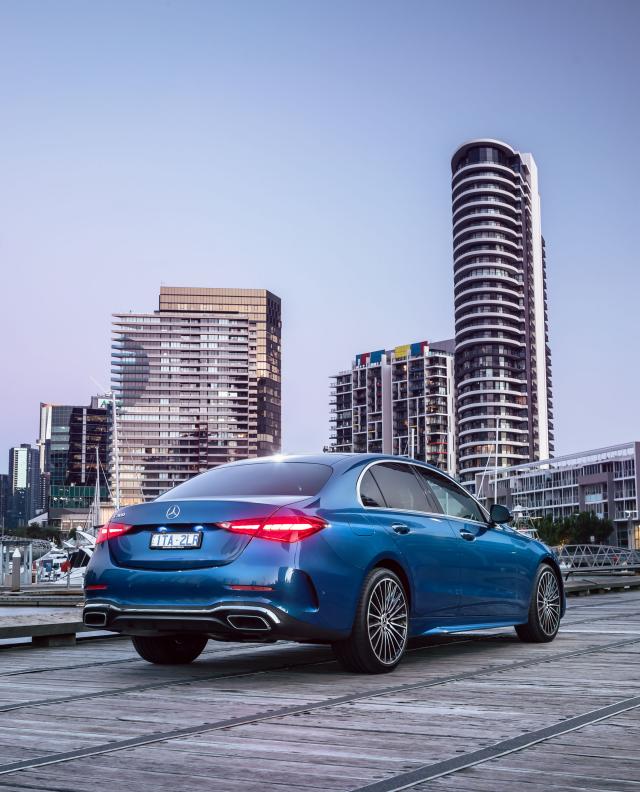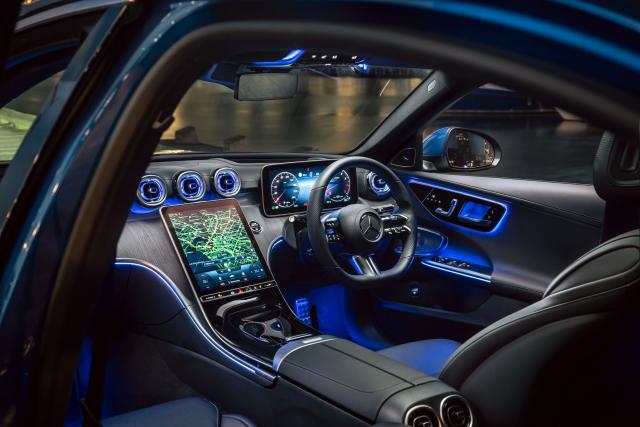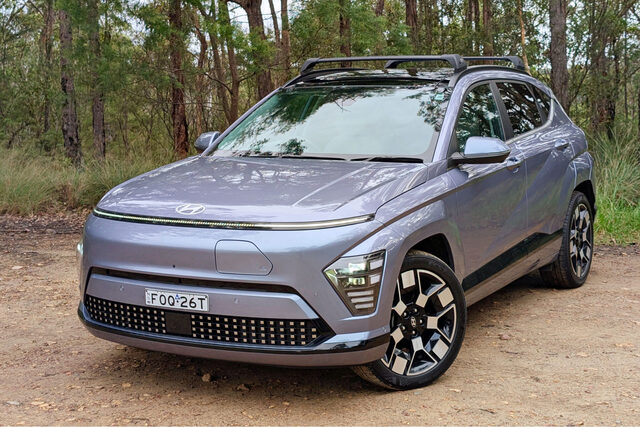The Mercedes-Benz C-Class has been around in Australia since 1993 and has consistently been the company’s biggest selling model, at least until the last few years when overtaken by a number of SUV variants.
C-Class comes in three body styles: coupe, convertible and sedan each with the choice of 1.5-litre (C 200) or 2.0-litre (C 300) engines. Note that only the sedan versions have been given an upgrade at this time, the two-doors will arrive next year as will high-performance C43 and C63 AMG models. Our test car was a fully-optioned C 200 sedan.
STYLING
The latest Merc C-Class sedan follows similar lines as its large S-Class sibling with similar coupe-like profile and scalable lines. A long bonnet and shorter front overhang highlights this sleek appearance.
The oval grille features a single horizontal bar with the iconic three-pointed star in the centre of the grille. In a clever piece of design, the grille infill comprises hundreds of tiny matching stars.
Both the C 200 and C 300 have the AMG Line kit and body styling fitted as standard as well as 19-inch five-spoke AMG alloy wheels.
There are ten colour choices, nine of them being $2500 metallic options. Styling features with the optional Vision Package include a dual-pane panoramic sunroof.
INTERIOR
The interior of the C-Class inherits a number of design features from the S-Class and it brings a real premium look that hasn’t been there in previous models. The 2022 upgrade C-Class sedan gets a longer wheelbase than the previous model which converts into extra rear seat legroom.
You can store your user preferences and log into the car using a fingerprint scanner which allows multiple drivers to preset their seat position and cabin set up configured as soon as they activate their profile.
Boot capacity is 475 litres expandable with the rear seatbacks folded. This can be done without entering the car via small levers on either side of the boot’s interior.
ENGINES / TRANSMISSIONS
Mercedes C 200 is powered by a 1.5-litre four-cylinder turbo-petrol engine with outputs of 150 kW and 300 Nm of torque from a very handy 1800 rpm linked with a 48-volt mild- hybrid (MHEV) starter-generator that sits between the electric motor and nine-speed G-Tronic automatic transmission. The C 300 has a 2.0-litre turbocharged petrol MHEV that generates 190 kW and 400 Nm.
SAFETY
Standard safety features in the C 200 include 10 airbags, including pelvic and thorax bags for the driver and front passenger; enhanced ABS brakes with hold and brake drying functions; autonomous emergency braking; adaptive cruise control; electronic stability program with acceleration skid control; active bonnet; lane keeping assist; blind spot monitoring; active distance assist; active parking assist; front and rear parking sensors; extended run-flat tyres; hill start assist; speed limit assist; and tyre pressure monitoring.
The optional Driving Assistance Plus package adds active blind spot assist; active brake assist; cross traffic alert; active distance assist; active emergency stop assist; lane change assist; steering assist; stop-and-go assist; evasive steering assist; and traffic sign recognition.
DRIVING
The coupe-like roofline is likely to make entry and exit a bit awkward for taller occupants but once ensconced the front seats are large, supportive and comfortable. By necessity the driving position was lower than we prefer but that’s normal in passenger cars of this ilk.
There’s good rear leg and headroom for four adults without any compromise required from those in the front seats. The centre rear seat is really only suitable for children. Again, this is pretty well the norm for cars of this size.
We loved the tablet-style infotainment screen, positioned in the centre and slightly angled towards, and within easy reach of the driver.
Our test car came with the optional head-up display but the number of features occupied far more of the windscreen than we liked.
One of the most impressive features of the C 200 is its fuel consumption. Listed at 6.9 litres per 100 kilometres, we averaged 7.1 L/100 km during our test and even managed 6.0 L/100km on our 100 km return trip from Gosford to Sydney.
The nine-speed automatic shifted smoothly at all times with steering wheel-mounted paddles there if needed.
The feel of the brake pedal changes as you switch from regeneration mode to friction (normal) braking. During our testing we gradually became used to the feel.
While the C-Class isn’t designed as a sports machine you can set it up in sporty mode for more spirited driving. Handling is precise and the car responds nicely to inputs through the steering wheel.
SUMMING UP
Mercedes-Benz has tackled the tricky task of packing the luxury of its large S-Class into the mid-sized C-Class and done a pretty good job of it. It has come at a cost though, with the new C 200 priced at just under $80,000 before options and on-road costs.











